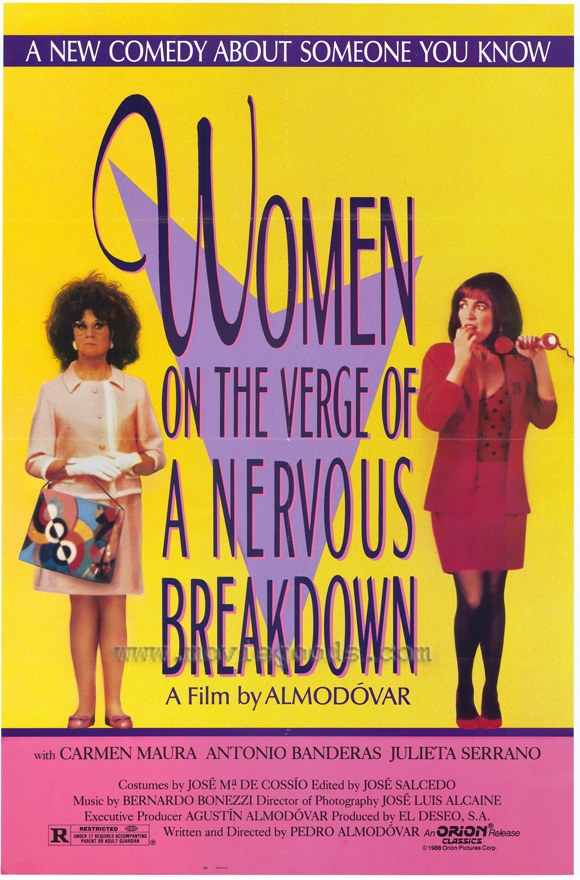

Director: Pedro Almodóvar, 1988.
Almodóvar is known for his absurd comedies and this is one of them. This was the film that catapulted him to international attention, winning numerous awards and being nominated for an Oscar. (He later won one for the 2002 Talk to Her.) More of a farce, it has a loose plot but strong characters.
Pepa (Maura Carmen) and Ivan (Fernando Guillen) are lovers who work together as voice-over actors who dub foreign films into Spanish. When Pepa wakes one morning Ivan is gone. He has left her. All he wants is his clothes, packed in a suitcase left by the door so he can pick it up later. He is going on an international trip with a woman, but not her.
When Pepa realizes his betrayal, she is mad. She has some news for him, but cannot reach him. He will not return calls and has made himself scarce. Indeed, he is not a main character in the movie. But we will return to Ivan later.
 As Pepa begins her search for him, she runs into a number of eccentric characters: Paulina (Kiti Manver), a feminist lawyer and Ivan's new lover; Lucia (Julieta Serrano), Ivan's wigged-out and bewigged ex-wife; Candela (Maria Barranco), a brainless model; Carlos (Antonio Banderas), Ivan's son; and Marisa (Rossy de Palma), Carlos' fiancee. Impossibly unlikely scenarios bring laughs to this comedy: a terrorist skyjacking plot, a barbiturate-spiked gazpacho drink, a burned bed, and windows broken by tossed telephones. Then there is the elegantly coiffed but overly emotional cab driver who finds himself repeatedly in Hollywood-like chase scenes. You can't help but find something to laugh about even if the story is somewhat disjointed.
As Pepa begins her search for him, she runs into a number of eccentric characters: Paulina (Kiti Manver), a feminist lawyer and Ivan's new lover; Lucia (Julieta Serrano), Ivan's wigged-out and bewigged ex-wife; Candela (Maria Barranco), a brainless model; Carlos (Antonio Banderas), Ivan's son; and Marisa (Rossy de Palma), Carlos' fiancee. Impossibly unlikely scenarios bring laughs to this comedy: a terrorist skyjacking plot, a barbiturate-spiked gazpacho drink, a burned bed, and windows broken by tossed telephones. Then there is the elegantly coiffed but overly emotional cab driver who finds himself repeatedly in Hollywood-like chase scenes. You can't help but find something to laugh about even if the story is somewhat disjointed. Like most of Almodovar's films (All About My Mother) the plot revolves around women, with hardly any men. However, he highlights the negative influence of men, and these women are all left on the verge of nervous breakdowns because of the men. In one scene clueless Candela says, "Men keep taking advantage of me. I always realize when it's too late." Certainly, in the narrative Candela has allowed herself to be taken advantage of. Likewise, Pepa made the choice to sleep with Ivan and become his lover. In some sense they have themselves to blame. They entered these relationships with eyes wide open.
Like most of Almodovar's films (All About My Mother) the plot revolves around women, with hardly any men. However, he highlights the negative influence of men, and these women are all left on the verge of nervous breakdowns because of the men. In one scene clueless Candela says, "Men keep taking advantage of me. I always realize when it's too late." Certainly, in the narrative Candela has allowed herself to be taken advantage of. Likewise, Pepa made the choice to sleep with Ivan and become his lover. In some sense they have themselves to blame. They entered these relationships with eyes wide open.Life is like that. We make choices and then live with the consequences. Sometimes these are positive and we call them blessings. Sometimes these are negative and we call these cursings, a fallout of poor decision making. Either way, if we are honest with ourselves, when we allow others to take advantage of us we are adopting a victim mentality. We can, we must choose to be stronger than that.
In ourselves we are weak. The apostle Paul recognized that. He cried out to the Lord three times to have a "thorn in his flesh" removed (2 Cor. 12:7-8). Each time, though, he was ignored. The thorn remained. Finally God answered him: "My grace is sufficient for you, for my power is made perfect in weakness." (2 Cor. 12:9) When we understand this we can turn to Jesus and find his strength and his grace sufficient. We can then make choices and live gracefully with the results, not like Pepa or Candela, but like Christ.
 If the women are clueless and victims of the men's infidelities, the men in this movie are weak. Not weak in Paul's sense, but weak in character. In particular, Ivan, whose infidelities are central to the main plot, is told by Paulina his latest lover, "You're weak, Ivan." He doesn't argue, he simply agrees, "Yes, sweetheart." He knows who and what he is.
If the women are clueless and victims of the men's infidelities, the men in this movie are weak. Not weak in Paul's sense, but weak in character. In particular, Ivan, whose infidelities are central to the main plot, is told by Paulina his latest lover, "You're weak, Ivan." He doesn't argue, he simply agrees, "Yes, sweetheart." He knows who and what he is.Ivan's weakness has prevented him from working through his relationship issues. His weakness has caused him to move from one lover to the next when he gets tired of them or things get tough. The weakness of infidelity is that without commitment it is easier to move on than to stay put.
How often have we experienced struggle in our marriages? By bringing two people together in this form of union it is inevitable that tension and conflict will occur. Yet, it is by working through the conflict that we can become stronger. The strength of our commitment shows in the length of our confederation together. Marriage is a God-blessed and God-ordained institution from the very beginning (Gen. 2:25). He wants marriage to last and that is why he says, "I hate divorce" (Mal. 2:16). Worse, though, is the weakness of giving up and moving onto someone with whom we are not committed. Not only do we degrade our own marriage, we cheapen the illicit relationship we embark on. No, it shows a far stronger character to remain faithful and work through issues with the wife or husband of your youth.
Copyright ©2009, Martin Baggs

Your missing the whole point of the movie. It was not made to showcase or focus on marriage, so don't try and make it into a broken marriage story. It was focusing on women and how they can deal with the problems that they are presented with, albeit in a comedic setting. Don't abuse this movie and try to make it into a platform against divorce, its not. You shouldn't try to pigeonhole a film into something you want to say, especially when this film is seeping with women rights, and the play on stereotypes. Why not talk about that and how women are so oppressed, even in our world today? Even in the church?
ReplyDelete